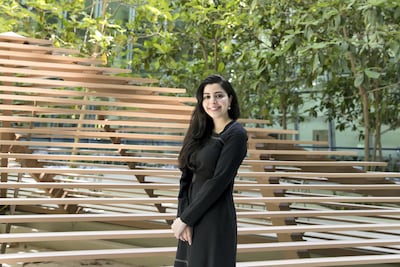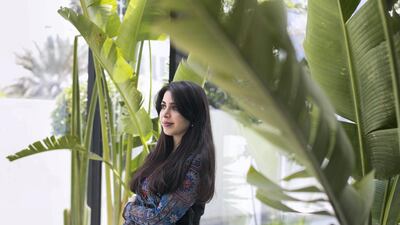The UAE has taken great strides to reduce the gender gap but that does not mean women should be complacent in demanding their rights, an Emirati PhD student has said.
Rana Al Mutawa, winner of the inaugural University of Oxford-Sheikh Mohammed bin Rashid Al Maktoum Graduate Scholarship, has been working to compile and document the struggles of women in the Gulf for an upcoming book which she plans to publish soon.
“Gathering these stories made me feel that there are so many [battles] at home that are not being acknowledged," the 28-year-old said. "Women still have to fight to marry the man of their choice. We acknowledge the achievements of women, but no one seems to see the struggle.”
According to Mrs Al Mutawa, the UAE’s path to women’s liberation is a private one, with much of the fight happening behind closed doors and this is in contrast with the West.
“When you look at Western societies and how women’s rights came about, it had a very public beginning with protests, civil rights societies and women’s rights organisations.”
And while women overseas take to the streets to champion their cause, in this country, to a large extent, Mrs Al Mutawa said, the fight for rights begins at home. She said some families still do not allow women to study abroad.

“I think a lot of progress has been made. That is amazing and we appreciate and recognise these achievements, but the conversation should not end with the belief that we have received all of our rights,” she said.
She also addressed the common claim that men are now 'the underdogs'.
“This is inaccurate and I have heard it many times before ... Women put a lot of effort into their work, and are then expected to give the same care and attention to their families, with many saying that this is a 'woman’s obligation'.”
One of the comments she has often heard is 'if a woman can’t take care of her children, then she shouldn’t be working'.
“They would never say this about a man," she said. "There are no expectations from fathers and men to share in care-giving responsibilities. There is a huge burden on women and society is too harsh on them. We need to discuss these things.
"Culturally, we still believe that a woman’s place is at home. We need to be less judgmental.”
_______________
Read more:
Emirati academic wins first scholarship to Oxford University from Dubai knowledge foundation
Dh4bn fund to help students without means achieve academic dreams
_______________
This week, the Dubai Women's Establishment announced a new board of all-female directors, but Mrs Al Mutawa said the conversation on women’s rights in the UAE should not slow down.
The DWE was formed in 2006 by Sheikh Mohammed bin Rashid, Vice President and Ruler of Dubai, with the aim of championing women to drive the socio-economic future of the emirate. It aims to increase the number of Emirati women entering work and enhance their representation in decision-making positions.
Sheikha Manal bint Mohammed bin Rashid, President of the Gender Balance Council, congratulated the new board of directors, who are replaced every three years and have diverse expertise ranging from economics to art. They are tasked with enhancing female participation in the workplace.
“These achievements were accomplished due to the solid foundations laid out by the late Sheikh Zayed bin Sultan, Founder of the UAE, who promoted the vital role of Emirati women in our society and encouraged their participation in all fields,” Sheikha Manal said.
The Federal National Council also recently approved the first legislation of its kind in the region ensuring equal wages for women.
Mrs Al Mutawa said having female groups like the DWE and ministers in top governmental posts helps change the mind-set of families who would have previously not accepted that their daughter or wife work. But that doesn't mean women should stop fighting.
“The problem is we say, 'look, we have all these rights' and we stop at there. Yes, we have female ministers and fighter pilots ... but women still face many struggles and we should talk about them.”
Mrs Al Mutawa used the example of Zayed University in Dubai, where women students have to clock in and out with a text message sent directly to their parents or husband to inform them if they are on campus.
“We need to be less judgmental of each other as women and the society needs to be less judgmental of us,” she said.
Mrs Al Mutawa has completed two master degrees, one in international affairs at Columbia University, US, and another in public policy from the University of Tokyo, Japan. She earned her bachelor’s degree in business administration from the American University in Dubai and she most recently taught Emirati studies as a professor at Zayed University.

